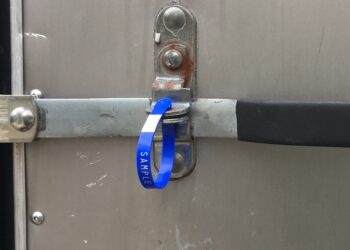In today’s interconnected world, international trade and shipping have become fundamental pillars of the global economy. As goods traverse across continents and through various supply chains, ensuring the security of shipments has become a paramount concern for businesses, governments, and consumers alike. ISO 17712:2013, a standard developed by the International Organization for Standardization (ISO), addresses this concern by setting rigorous requirements for the design, manufacturing, and testing of seals used on containers for international shipments. This certification plays a crucial role in safeguarding the integrity of goods during transit, mitigating risks associated with theft, tampering, and unauthorized access.
The ISO 17712:2013 certification services offer a comprehensive framework for maintaining the security of global shipments. This standard outlines specific guidelines for the construction and performance of mechanical seals, which are used to secure containers and prevent unauthorized entry. These seals are designed to withstand various environmental conditions, mechanical stress, and tampering attempts. The certification process involves rigorous testing of these seals to ensure their effectiveness in real-world scenarios.
One of the key components of ISO 17712:2013 is the classification of seals into three main categories based on their security level. These categories include “High Security Seals,” “Indicative Seals,” and “Security Seals.” Each category has distinct features and applications, catering to different security requirements and risk levels. High Security Seals, for instance, are designed for use in high-risk situations and are constructed to withstand sophisticated tampering attempts. On the other hand, Indicative Seals provide visual evidence of tampering and are typically used in situations with lower security risks.
Obtaining ISO 17712:2013 certification involves a comprehensive assessment of seal manufacturers’ processes, quality control measures, and testing protocols. Manufacturers seeking certification must adhere to stringent requirements, such as using tamper-evident materials, maintaining consistent production standards, and conducting regular audits. This certification not only instills confidence in the reliability of the seals but also fosters trust between stakeholders involved in the shipment process.
The benefits of ISO 17712:2013 certification services extend beyond the realm of security. By adhering to these standards, businesses can enhance their reputation as reliable and responsible partners in the global supply chain. The certification serves as a testament to a company’s commitment to maintaining the highest level of security and integrity in their operations. This, in turn, can lead to increased customer satisfaction, improved business relationships, and potentially open doors to new markets and collaborations.
Furthermore, ISO 17712:2013 certification contributes to regulatory compliance, helping businesses meet international security standards set by organizations such as the World Customs Organization (WCO) and the Customs-Trade Partnership Against Terrorism (C-TPAT). Compliance with these standards is essential for avoiding delays in customs clearance and ensuring the smooth flow of goods across borders.
In conclusion, ISO 17712:2013 certification services play a vital role in ensuring the secure transit of goods across the globe. By establishing stringent requirements for the design, manufacturing, and testing of seals, this certification standard mitigates security risks, deters tampering, and enhances the overall integrity of shipments. Beyond security, the certification fosters trust, improves business relationships, and aids in regulatory compliance. As international trade continues to evolve, ISO 17712:2013 remains a cornerstone of secure and reliable global shipping operations.












